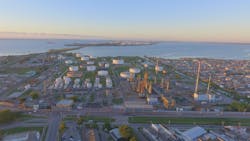Petrobras processes 100% renewable feed in Riograndense FCC
Petróleo Brasileiro SA (Petrobras), alongside partners Ultrapar Participações SA and Braskem SA, have completed the first phase of a pilot project to test processing of petrochemical products and fuels from 100% renewable materials at jointly owned Refinaria de Petróleo Riograndense SA’s (RPR) 17,000-b/d refinery in Rio Grande, Rio Grande do Sul, Brazil (OGJ Online, Nov. 6, 2023).
Carried out between end-October and early November 2023, the test involved the first processing of 100% soybean oil in the refinery’s existing conventional fluid catalytic cracker (FCC) using proprietary technology developed by Petrobras’s research and development center (CNEPES), combined with proprietary catalysts from the ReNewFCC line produced in partnership with Fábrica Carioca de Catalisadores SA, , a joint venture between Petrobras and Albemarle Corp. subsidiary Ketjen Corp., Petrobras said on Nov. 8.
In addition to marking the world’s first instance of an FCC processing 100% renewable feedstock, the pilot test proved use of the technology with process and catalyst innovations makes it possible to use 100% renewable raw materials as feedstock to generate fully renewable petrochemical products, the operator said.
The industrial test began during the last week of October, when RPR carried out a maintenance shutdown to prepare the FCC unit to receive and process the 2,000 tonnes of soybean oil according to CENPES' specifications and guidelines beginning on Nov. 1, according to Petrobras.
With first-phase testing now completed, Petrobras said RPR is preparing to produce petrochemical inputs and renewable fuels such as LPG, maritime fuels, propylene, and bioaromatics (e.g., BTX, or benzene, toluene,and xylene) used in the synthetic rubber, nylon, and polyvinyl chloride industries.
The testing also identified that the BTX concentration levels achieved using the special catalysts are capable of meeting levels required to formulate high-performance, nearly sulfur-free gasoline, Petrobras said.
Scheduled for June 2024, the pilot project’s second-phase test will involve the co-processing of mineral feedstock with bio-oil—advanced raw material from non-food biomass—to generate propylene, gasoline. and diesel, all with renewable content.
Petrobras said it is investing around 45 billion Brazilian real ($9.17 million) to enable the completion of RPR’s renewable feedstock processing test project in line with research, development, and innovation clauses as set out by Brazil’s Agência Nacional de Petróleo, the country’s National Petroleum Agency.
Biorefining future
For RPR and its ownership partners, the pilot’s first-phase test marks the strategic way forward to the future of biorefining in Brazil as part of the country’s broader journey in the global energy transition.
“With the technology proof stage completed on an industrial scale, RPR will be able to explore business alternatives for the production of renewable products, and Petrobras will have new alternatives to evaluate in the future in its own refineries, in addition to the projects already in progress related to co-processing for the production of renewable diesel and dedicated units for the production of aviation biokerosene and renewable diesel,” Petrobras said.
“The Petrobras technology licensed to [RPR] will allow us, next year, to produce renewables without ceasing to serve our current product and fuel market,” said Felipe Jorge, RPR’s director.
RPR’s first phase of testing renewable feedstocks follows a May 2023 agreement signed between its owners, under which the partners agreed that—if successful—the pilot program could result in conversion of RPR’s refinery into Brazil’s first biorefinery producing finished products from 100% renewable feedstock.
About the Author
Robert Brelsford
Downstream Editor
Robert Brelsford joined Oil & Gas Journal in October 2013 as downstream technology editor after 8 years as a crude oil price and news reporter on spot crude transactions at the US Gulf Coast, West Coast, Canadian, and Latin American markets. He holds a BA (2000) in English from Rice University and an MS (2003) in education and social policy from Northwestern University.

